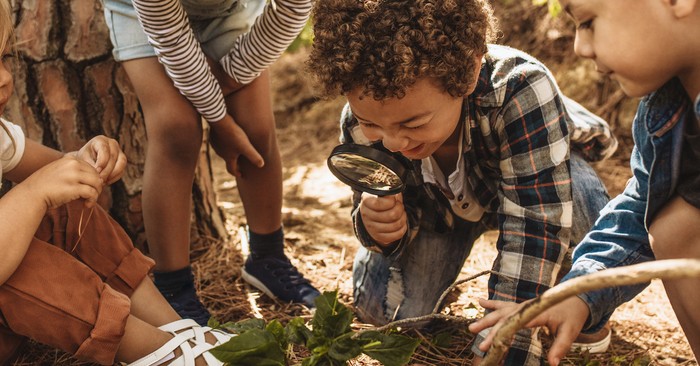
Play enhances cognitive development in children. Running around outside stimulates the brain to better attention and apprehension of academic material. If I had followed through on my inclination to cut back on outdoor time, I would have paid a steep price in productivity.
As spring breezes and warm sunshine take over the United States, consider this information from the Centers for Disease Control and Prevention1:
Less than one-quarter (24%) of children 6 to 17 years of age participate in 60 minutes of physical activity daily.
In 2017, only 26.1% of high school students participated in at least 60 minutes per day of physical activity on all seven days of the previous week.
In 2017, 51.1% of high school students participated in muscle-strengthening exercises (e.g., push-ups, sit-ups, weight lifting) on three or more days during the previous week.
In 2017, 51.7% of high school students attended physical education classes in an average week, and only 29.9% of high school students attended physical education classes daily.
Additionally, Shape America2 reports the following unhealthy trends for America's children:
33 percent of students watched television three or more hours per day on an average school day.
41 percent of students used computers (for non-school work activities) or played computer or video games three or more hours per day on an average school day.
These statistics date back to before Covid-19. I suspect the years of pandemic restrictions have only worsened the sedentary habits of our children.
As a mom who homeschooled for sixteen years, I would like to believe children educated at home fall outside these appalling norms. Nevertheless, I remember feeling anxious each spring if my kids were not on track to complete their curriculum by the end of the school year. The unfinished math book tempted me to consider curtailing outdoor time to buckle down and finish well academically.
To my goal-oriented personality, free play took second place to hitting the books. Play seems so unproductive. I can't record a grade for my child in outdoor play. Perhaps you, like me, often feel more pressure about the three capital R's than the "less important" recreation.
Thankfully, I knew better than to fall for this faulty reasoning. Play enhances cognitive development in children. Running around outside stimulates the brain to better attention and apprehension of academic material. If I had followed through on my inclination to cut back on outdoor time, I would have paid a steep price in productivity.
According to the Department of Health and Human Services3, we can't overestimate the benefit of outdoor play for our kids' physical, cognitive, social, and emotional growth. Benefits include:
-Aerobic fitness
-Muscular fitness
-Enhanced creativity
-Strong immune system
-Stimulated imagination
-Mental acuity
-Social development
-Connection with God through creation
-Space and time to wonder
-Improved mental health
-Increased ability to communicate
-Fun
Traditionally, kids itch to head outside when spring arrives after dreary, cold winter reduced their outdoor play. On the other hand, with many parents reporting their children spend little time outside, they may not know what they're missing. Kids may resist going out and cling to the familiar screen time that occupies their minds.
If your children have little outdoor experience, don't be surprised by resistance. You may need to insist on playtime until they experience the benefits for themselves. You can facilitate their outside tolerance with the following springtime activities.
21 Outdoor Activities for Spring

Collections: Send your kids outside to look for collections based on their development. For example, ask them to find particular shapes or textures in nature. Look for shared characteristics such as flying things, growing things, or things with four parts. Prepare to ooh and ahh over bugs, dirt, and pretty flowers.
Spring Field Day: Allow your kids to come up with creative and fun relay races. Give them materials to make medals for winners. Invite friends to your backyard or a nearby park for a friendly competition.
Hike the Trails: Learn about hiking trails in your area and set a goal to explore them. Older kids can plan the route and navigate using maps. Forget the cell phone app unless you're seriously lost.
Park Days: Meet up with friends at a nearby park at least once a week. Allow them to play without helicopter parenting. They will learn to brush off a skinned knee, resolve arguments, and problem-solve to take turns.
Signs of Spring Scrapbook: Take walks to find signs of spring in nature. Take pictures, collect physical objects, or do both. At home, print out pictures and make a scrapbook.
Park Programs: Look online at the nature programs your local recreation center or nearby state parks offer. You can get junior ranger books at state parks to accompany the programs. While at the park, be sure to let your kids freely explore the woods, creeks, and other beauty found there.
Spring Art: Send your kids out with sketchbooks and colored pencils throughout the spring. They can observe and draw flowers, bugs, animals, and birds. They could also draw the same item, such as a plant, through its stages of development week after week. By the end of spring, they will have a nice art collection.
Sun-day School: When the spring weather is too beautiful to resist, spread a blanket in the grass and do academics outside.
Bike Rides: Pump up the bike tires and break out the helmets for rides around the neighborhood or at the local park.
Dog Training: If your pup went stir-crazy over the winter and developed a few bad behaviors, engage your kids in training. Do it yourself with a book or YouTube videos, or sign up for a dog training course. Allow your kids to take responsibility.
Veggie Garden: Give your kids a small plot of land to plant vegetables. Pick up seeds and tools at your local hardware store. Find how-to books at the library. Let your children do the work and reap the harvest. Add a garden journal as a writing assignment.
Landscape Beautification: Buy potted flowers or start some from seed. Ask your kids to draw a plan and then plant the flowers.
Outdoor Chores: With just a few basic directions and tools, young kids can wash the car, pick up debris from the yard, rake out beds, and spread mulch. Older kids can learn to mow the grass.
Kite Flying: If you're feeling especially Mary Poppins-ish, go to the park with your kites on a breezy day. Let the kids figure it out while you relax in the sun.
Obstacle Course: Task kids with drawing an obstacle course design and creating it in the backyard. Once it's set up, invite friends to tackle it.
Cardboard Painting: Let kids cut up cardboard boxes and give them paints and brushes. Send them out in the yard to create their masterpieces.
Historical Reenactments: Read a book about battles and other historical events and send your kids outside to reenact the scenes. Look for outdoor living history productions in your area and follow up with a visit.
Outdoor Field Trips: Spring is the perfect time for field trips in nature. Attend a program at a park or play in the woods.
Yard Games: Head to the park with family or friends for lawn games such as Twister, corn hole, badminton, or croquet. If you prefer, play board games at a picnic table.
Flower Study: Go for a walk and collect different types of flowers. Bring them home and dissect them to observe their similarities and differences.
Scavenger Hunt: Find and print an outdoor scavenger hunt from the internet. Give your kids the list and send them out.
Your Kids' Well-Being
Charlotte Mason was a British educator and reformer who lived around the turn of the twentieth century. Karen Andreola describes part of Mason's education philosophy:
Children apply their minds at the time of morning lessons. Afternoons provide recreation. This means running, climbing, yelling, all out of doors for children. Handicrafts, chores, life skills, practicing an instrument, and play, are their homework.4
While you won't be able to record a specific grade for these fun and educational activities, many directly relate to cognitive and skill development. You can record them as part of your homeschool physical education curriculum. Other activities may not directly correlate to subjects and grades, but you will notice benefits in overall learning.
Better yet, spending time outdoors will make your children healthier and happier, enjoying a greater overall sense of well-being. Get out and enjoy the springtime!
Notes:
1https://www.cdc.gov/healthyschools/physicalactivity/facts.htm
3https://health.gov/sites/default/files/2019-09/13_F-7_Youth.pdf
4https://charlottemason.com/charlotte-mason/
Photo credit: ©GettyImages/jacoblund

Related Resource: Strengthening Your Marriage While Raising a Child with Disabilities
In this episode of Empowering Homeschool Conversations, your host Annie Yorty and her special guests dive into the unique challenges and beautiful complexities of maintaining a strong, loving partnership while navigating the demands of special needs parenting. Our expert guests bring a wealth of knowledge and personal experience to the table, offering invaluable insights and practical strategies for fostering resilience, connection, and joy in your marriage. Whether you're homeschooling parents seeking support, or simply looking for ways to strengthen your relationship amidst life's challenges, this conversation promises to provide the inspiration and tools you need to thrive together. Listen now!







